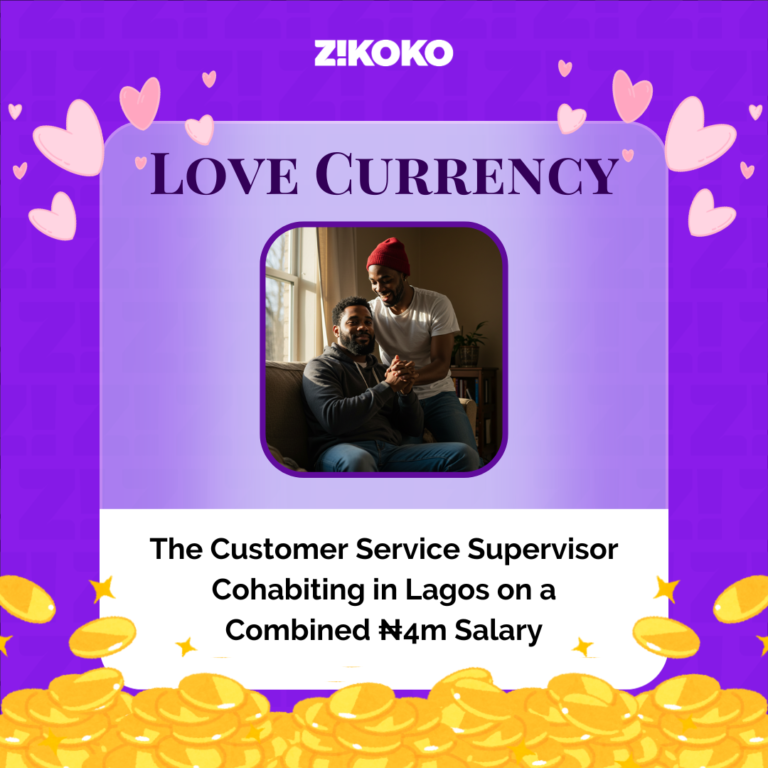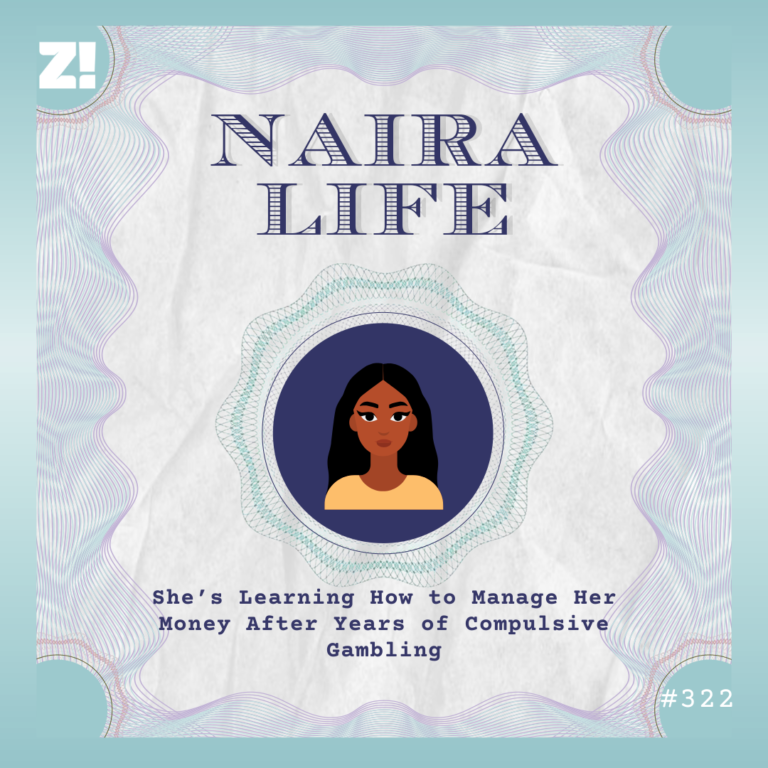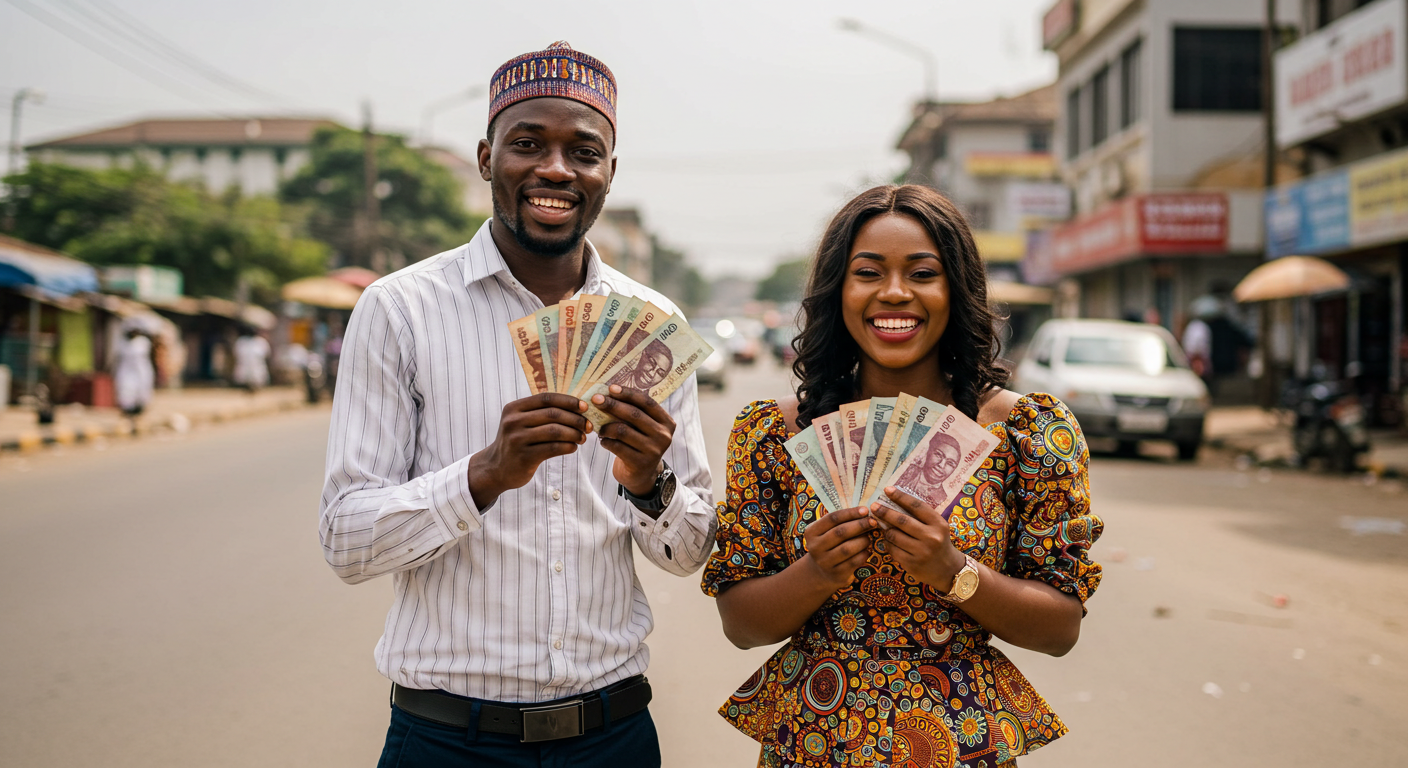Every week, Zikoko seeks to understand how people move the Naira in and out of their lives. Some stories will be struggle-ish, others will be bougie. All the time, it’ll be revealing.
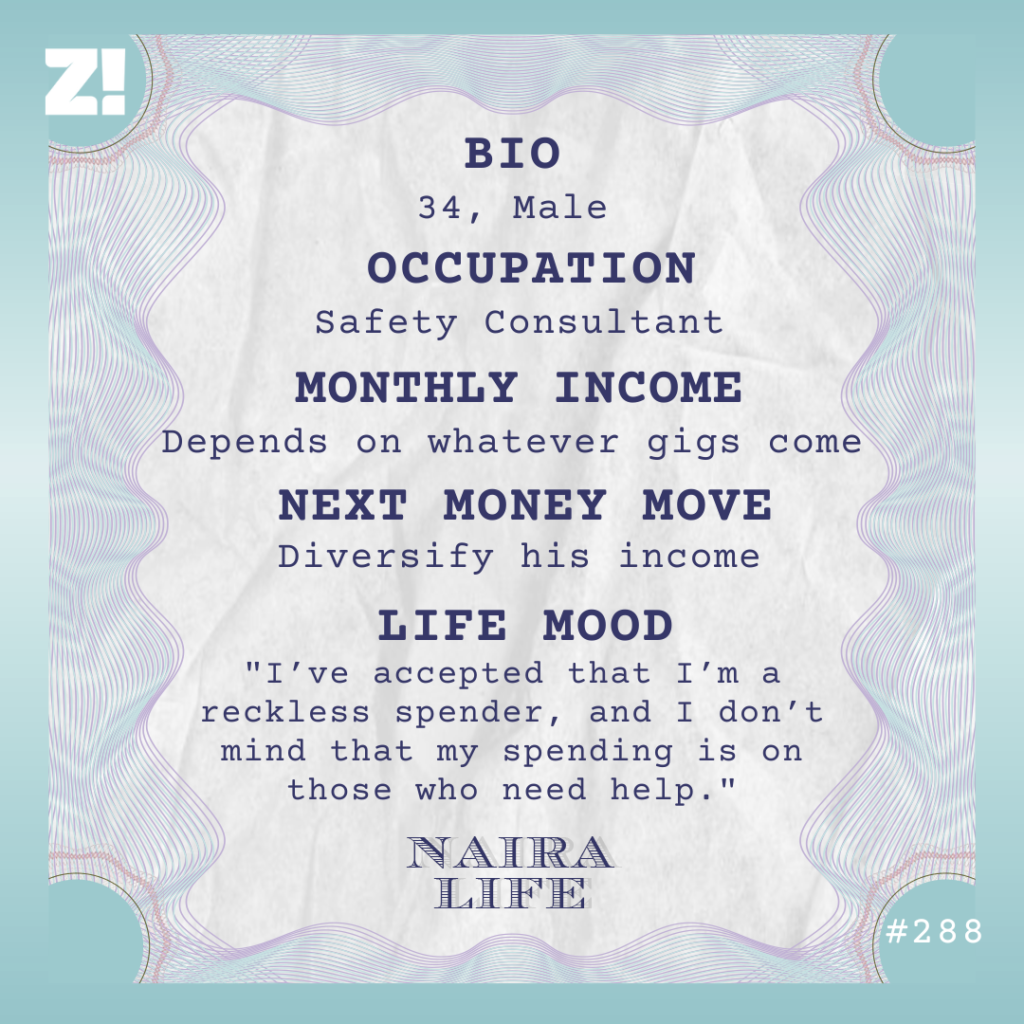
What’s your earliest memory of money?
That was in 2010. I didn’t really understand what money could do and how it felt to earn it before that time.
What changed?
So, I was in my second year and my uni was organising a rag day — it’s an event where students dress funny and go out to make money. I didn’t participate because it wasn’t my thing, but I helped a friend with their costume and jokingly requested a percentage of whatever money was made.
My friend got a lot of money almost as quickly as they went outside. When my other colleagues saw that, they rushed to me and asked me to help with their costumes. After the whole thing, they returned and gave me a cut of their earnings — ₦2k here, ₦1k there. I don’t remember exactly how much I made, but it was cool cash for simply exploring my creativity.
It was also the first time I held money that hadn’t passed through my parents’ strict approval process for financial matters.
Tell me about your parents
My parents were teachers and were very strict. They believed that letting children have money could lead them to vices. They were right, sha. In secondary school, I had friends who gambled among each other, but I couldn’t join because I didn’t even have as little as ₦5 on me — my siblings and I took lunch to school, so there was no reason to handle money.
Also, if a family member gave me money, I was meant to immediately hand it over to my parents, who decided what to do with it. If my mum saw a pencil she didn’t buy in my bag, all hell would let loose.
I can trace my lack of a savings culture to my upbringing. Imagine me trying to save as a child. With which money? Even if I miraculously found money, how was I supposed to explain keeping it? My parents controlled everything in our house, which followed me until that point in university when I finally did something independently.
Did you try something else to make money after that?
Yes. But I just pursued a passion and ended up getting paid for it. I loved organising tutorials for colleagues in uni, and one time in my third year, a friend asked if I could cover for her at work because she was writing exams.
She worked at a company that connected tutors to parents who wanted after-school lessons for their kids. So, while my friend was away, I tutored her client’s kid. When she returned after two weeks, the child’s parents called the company and asked to retain me for their child while my friend taught someone else.
They liked you that much?
Apparently, they did. The company employed me and paid me ₦20k/month to teach the child thrice a week. About a month later, I got a different gig through a senior colleague to teach maths and physics to someone preparing for WAEC.
Then, I got another referral from the same senior colleague. I juggled the three clients until my final year and made about ₦70k/month from all of them. In my final year, I had to scale back down to one client —the one paying ₦20k — because I wanted to focus on my studies and pass well. I’d been an unserious student for most of uni, and final year was my last chance.
Thankfully, I graduated with good grades and held the job for a few more months until I landed a new one in 2013. The new job was in health and safety, which aligned with what I studied in school, so I dropped the teaching gig to focus on my new role.
Was the pay better?
Haha. My salary was ₦5k/month. It was a serious pay cut, but I wanted professional experience. I lived with some friends and didn’t have to worry about rent. The ₦5k covered my transportation for only 2-3 weeks, and I had to rely on my friends for transport fare.
I supplemented my salary with occasional tutoring gigs — I got one in 2014 that paid ₦60k/week for a two-month period.
Fortunately, I landed a similar role at a non-profit in 2016. My starting salary was ₦60k/month, but it got up to about ₦100k after transportation allowance and other incentives.
A welcome relief from ₦5k/month, I imagine
It was. However, my lifestyle didn’t change much. I had free accommodation courtesy of my job. I’m not social, and I’d grown used to living on very little income, so there was almost nothing for me to spend on.
That said, I began giving out money. I like helping people, and since I wasn’t doing anything with money, I was using it to meet people’s needs — especially friends and family. If someone complained about a need on WhatsApp, I’d DM them and send them money.
About six months into the job, my salary increased to ₦80k. My need to travel for official duty also increased, and the allowances from travelling and field work brought my monthly income to ₦200k.
Did you consider savings or investments?
I didn’t grow up with a savings culture, so it wasn’t the first thing that came to my head. So, even though I was earning more than I ever had, I was always broke before month’s end.
In 2017, my mum noticed my terrible spending habits. She’d asked me for ₦50k, and I ended up sending ₦100k. She also learned from my siblings that I always gave extra money whenever they asked, so she called and told me it was time for me to learn how to save for a rainy day.
My mum opened a cooperative account in my name and asked me to decide on a monthly deposit I was comfortable with. I decided on ₦100k, and from then, I just sent the money to her monthly to help me save it.
I didn’t have access to it and had no desire to keep track of whatever I sent to her. My own was: They’ve told me it’s good to keep money, so let me just keep it. I didn’t have a goal.
I’m screaming
I worked at the non-profit till 2019, and my income grew to about ₦400k/month before I left.
Around the same time, my mum suggested I invest my cooperative savings in a landed property. Honestly, I was fine with just keeping it, but she advised against saving indefinitely.
So, I used most of the money — about ₦3m — to buy seven acres of land. The first day I stood on the land, I thought, “Hey, maybe investments aren’t so bad.” Like, I couldn’t see the end of the entire property, and it was all mine.
I farmed plantains on the land for about two years and made some profit, but I stopped because I struggled to juggle it with other responsibilities. Plus, I didn’t buy the land to farm. The goal is to build an estate on it someday.
I was just about to ask if you left the non-profit for farming
I left because I wanted to get a master’s degree, but my workplace didn’t let me. I even suggested a part-time study program, but they were against it. I decided that it was better to upskill than hold on to a job that could kick me to the curb, so I resigned and became a freelance consultant. I also stopped saving with the cooperative since I no longer had a consistent income.
Did you have a plan for school expenses with an inconsistent income?
I have contacts in the non-profit sector. I knew I’d still get something every other month. The only thing was, I couldn’t predict what my income would be. With consulting, you can make ₦200k today and ₦2m tomorrow.
I planned to freelance for only two years. After my master’s program, I’d re-strategise and return to an office job. Unfortunately, the pandemic happened and disrupted my academic calendar. Even after schools reopened, ASUU went on an eight-month strike, essentially wasting the whole of 2022.
I finished the program this year, so I’ve been a freelance consultant for longer than I planned. Fortunately, I get consulting gigs fairly regularly, so I survive. I also got married in 2021, and while that has increased my responsibilities, it’s also helped me manage the reality of having an inconsistent income.
How so?
We’ve already established I’m a spontaneous giver. I can’t stand seeing people in need and looking away. I could get away with that on a monthly salary, but consulting is different. If I make ₦1.2m today, I can’t just blow it because I don’t know if I’ll earn anything for the next few months.
It requires extensive financial planning, which isn’t my strength. After I got married, my wife and I decided it was best that she controlled my finances, and we’ve stuck with that. I don’t have access to my accounts or know how much I’m worth, and it works well for us.
Also, I believe that men having extramarital affairs is directly proportional to them having money. With the way I spend, I know having money might be a tempting factor to go that route, and I don’t want it. There’s no way to have a woman on the side if you don’t have a kobo to your name, and I’m fine with that.
I’m curious. How does the financial arrangement with your wife work?
My wife has all my bank apps on her phone, and she also receives the SMS alerts. I don’t get alerts, and I don’t have an ATM card either. I have zero access to my funds. Whenever I get paid for a job, she’s the one who tells me that money has entered my account.
She allocates the funds to whatever need we have at the moment. She also ensures there’s still money to run the home and attend to family emergencies in the months I don’t earn anything. She even buys me clothes or whatever she thinks I need. If I need money to repair the car, for instance, I call her, and she transfers money to the mechanic.
So, you don’t hold cash at all?
Nope. Sometimes, my wife puts money in one of the ATM cards if I want to buy something. But it’s always the exact amount because we both know I can still dash the extra cash to a random groundnut seller on the road.
I should mention that no one knows about my wife controlling my finances — not even my family. I know people would think it strange, so we keep it to ourselves.
Have there been any challenges with this arrangement?
The only challenge is that it’s quite difficult to make a transaction my wife disapproves of. For instance, I could ask her to transfer ₦150k to someone who needs a new phone.
Of course, she’ll query it, and if she doesn’t think the reason is good enough, she tells me we can’t do it or suggests a smaller amount. Sometimes, I try to defend my reason. Other times, I don’t push it.
I’d like to know how someone like you thinks about money
Money provides one of the easiest means to help people. I hate seeing people in need and looking away.
Right now, I’m looking forward to bigger consulting jobs and businesses, and it’s majorly because I want to be able to confidently ask my wife to increase our giving budget.
At least I’ve accepted that I’m a reckless spender, and I don’t mind that my spending is on those who need help.
So, how do you move money around these days?
I work from home most days, and with my wife handling the majority of the household’s needs, my spending oversight is limited to fueling the car, electricity, and monthly allowances.
Let me break it down:
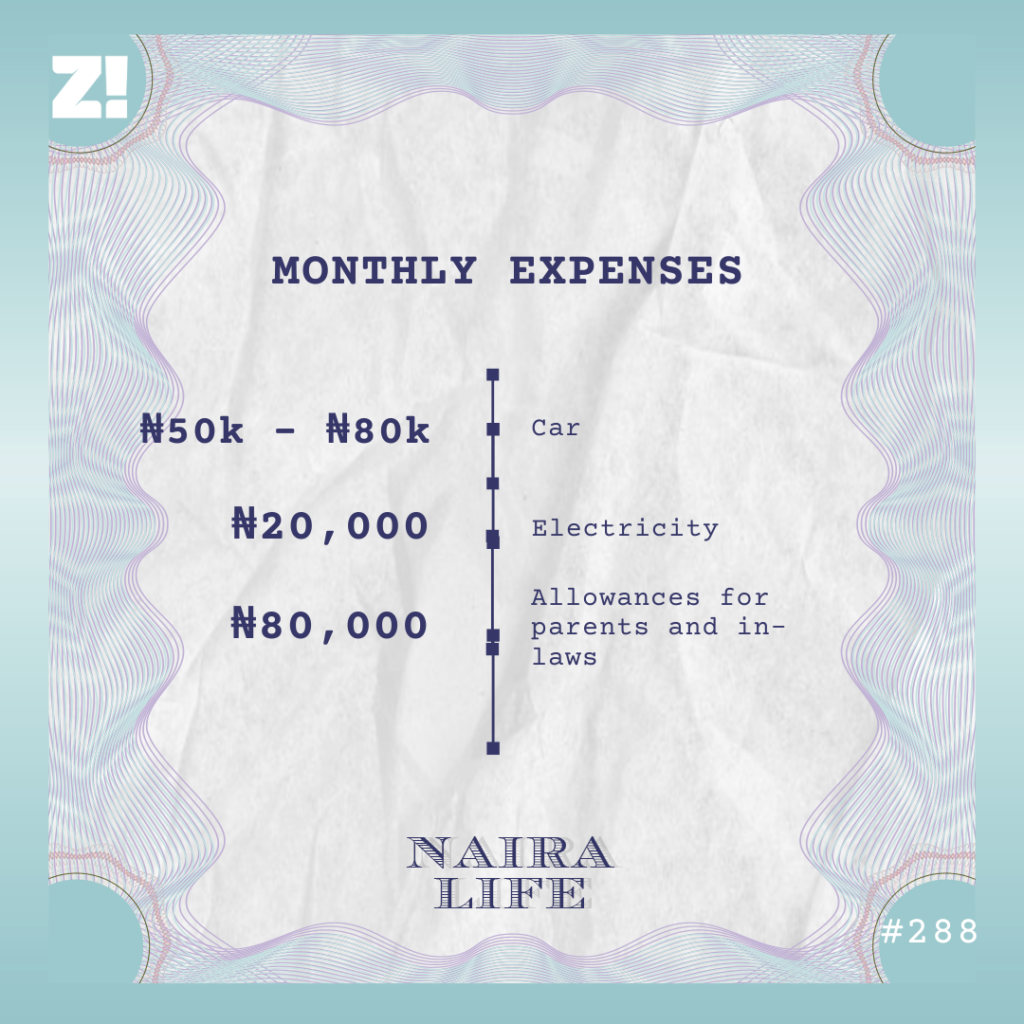
Is there anything you want right now but can’t afford?
Solar electricity to increase my efficiency. My house is also my office, and the epileptic power situation in Nigeria is so crazy. The last time I checked, I’d need about ₦1m for a small solar system to power my office. To power the entire building, I’d need about ₦4m. According to my wife, we can’t afford either right now.
What was the last thing you bought that significantly improved your quality of life?
My laptop, which I bought for about ₦1.4m earlier this year. It comes with a smart pen, and for someone like me who does a lot of pitching, it’s so easy to pictorially represent a concept or solution I’m trying to proffer to clients. The laptop just has a lot of crazy features that make brainstorming seamless.
Is there anything you’d like to be better at financially?
I’m currently working on diversifying my income, considering that Nigeria’s economy isn’t smiling anymore. I can put on many hats, and I just need to figure out which skill I can utilise to get another income source to stabilise my finances.
How would you rate your financial happiness on a scale of 1-10?
I’d like to split that into two: income and spending. My income rating is 5 because I still need to get more income sources.
My spending rating is 2 because of my poor spending habits. I’ll rate it higher when I learn how to handle my spontaneous spending, or better still, earn enough so I can spend spontaneously and not feel it.
If you’re interested in talking about your Naira Life story, this is a good place to start.
Find all the past Naira Life stories here.


